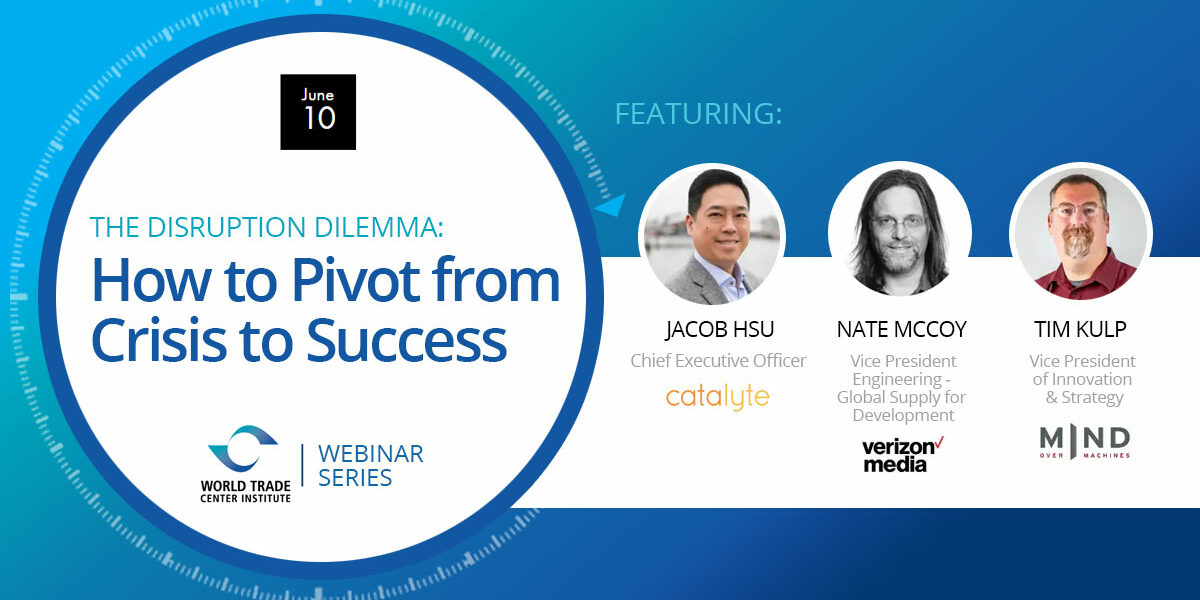The World Trade Center Institute is doing its part to keep us virtually connected through a series of webinars exploring the impact of COVID-19 and how our global business community can emerge stronger. To tackle the topic of disruption, series organizer Lydia Yodie turned to an industry that has some experience with it: the tech sector.
Serving as moderator, Mind Over Machines VP of Innovation & Strategy Tim Kulp joined Catalyte CEO Jacob Hsu and Verizon Media VP of Engineering Nate McCoy in welcoming all business leaders to the perpetual upheaval that has been their reality forever. There’s always a hot new technology, a new competitor, obsolescence lurking right around the corner. For tech companies, “Crises and pivots and change are part of the business model. It’s standard operating procedure,” Hsu said. “We’re always fundamentally rethinking our business model.” Creative destruction is a powerful force in tech.
Some additional key takeaways:
Find Freedom in Crisis
The panelists were certainly not making light of today’s disruptions. We’re navigating a public health crisis unlike anything seen in 100 years. Social unrest is forcing us to address the structural inequalities underlying our entire society. To survive, companies must execute operating plans that shore up core business and stem losses. Beyond that, seize the opportunity disruption offers to launch quick, innovative experiments, ‘move fast and break things.’
“I think crises are actually the best times to try out crazy ideas,” Hsu advised, noting Catalyte launched RetrainAmerica and opened a new talent development center during quarantine. McCoy shared his start-up experience overcoming a string of national crises and navigating what some might consider rock bottom before eventually selling to Microsoft in its largest acquisition to date.
Nothing ever goes exactly as planned, but if you’ve done the strategic thinking, looked at all the angles and banked some interesting ideas, you’re positioned to adapt. Kulp reminded us of Eisenhower’s battlefield advice: “Plans are useless, but planning is indispensable.”
Cultivate Continuous Growth Mindsets
In a time of crisis, people want to be helpful. They want to step up and contribute, observed Hsu. But to truly be comfortable with change, employees must feel empowered to effect it. Kulp elicited tips for helping employees become change agents who act, rather than being acted upon. The panelists agreed lifelong learning is key.
Here again, courage, communication and trust are essential. McCoy explained how trust is built by demonstrating vulnerability, stepping outside of your comfort zone. Leaders need to consistently model willingness to learn and then talk about what they learned. Hsu likened great software engineers to great musicians. They become great because of how much they play, who they play with, what kinds of music they play. People with continuous growth mindsets constantly put themselves in new situations. They share Mind Over Machines’ mantra: “Learn, Grow, Stretch.” And they are invaluable in a crisis.
Define Success with Balanced Outcomes
Of course companies need explicit metrics for measuring success, but they also need to diversify those metrics. If you are laser-focused on the bottom line when crisis strikes, things can look pretty bleak. Hsu cautioned against over-optimizing for one metric. It puts all your eggs in one basket, which is never a good crisis strategy. Instead, work to balance your business and people metrics. What does success look like on the books and in the world? Especially in times of crisis, our global economy needs your company to do well and do good.
Catalyte is a great example of explicitly balanced outcomes. The company recruits and trains software developer talent based on aptitude rather than pedigree. Thus, it uses 3 metrics to define success: (1) Revenue growth (its own and clients’), (2) Diversity (Does its workforce look like the area it’s hiring from?) and (3) Socioeconomic mobility (Is it doing right by that workforce over the long haul?). To put it in Mind Over Machines’ terminology, the mission is to enrich lives.
ICYMI
It was a pleasure to participate in WTCI’s webinar series. This recap barely scratches the surface of insights explored. If you missed it, you can now watch The Disruption Dilemma: How to Pivot from Crisis to Success on demand.








